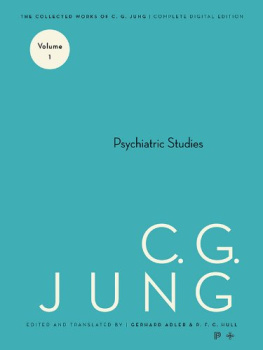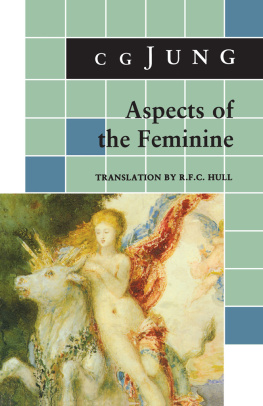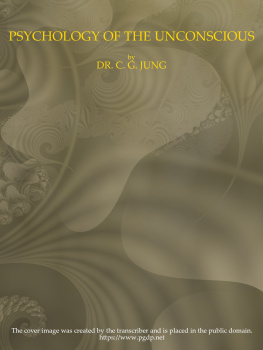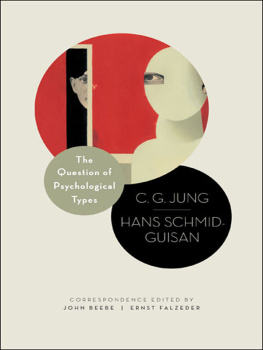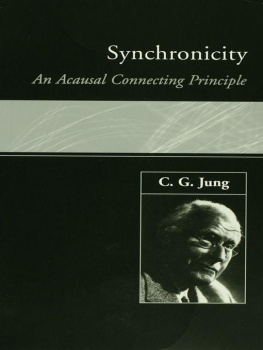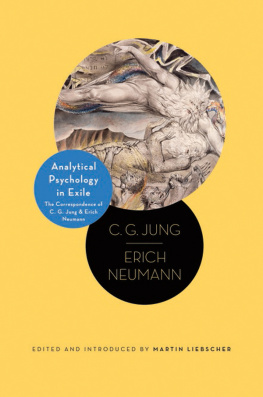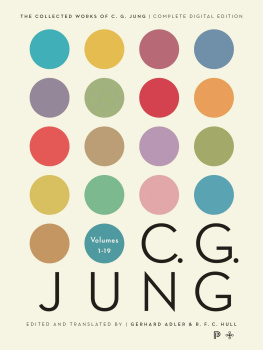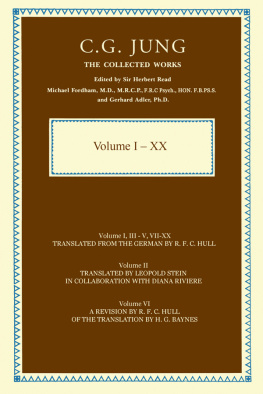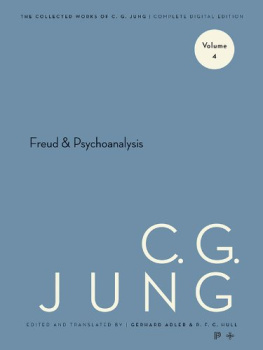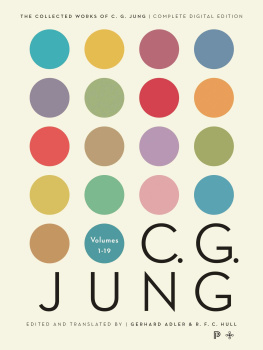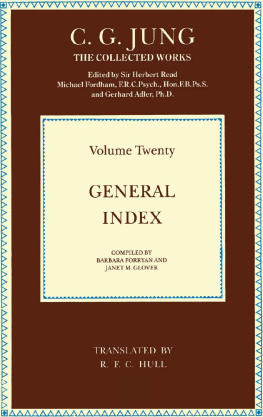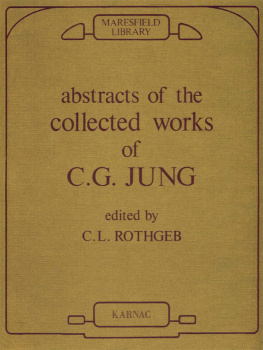C. G. Jung - The Collected Works of C.G. Jung: Volume 1: Psychiatric Studies
Here you can read online C. G. Jung - The Collected Works of C.G. Jung: Volume 1: Psychiatric Studies full text of the book (entire story) in english for free. Download pdf and epub, get meaning, cover and reviews about this ebook. year: 2014, publisher: Princeton University Press, genre: Art. Description of the work, (preface) as well as reviews are available. Best literature library LitArk.com created for fans of good reading and offers a wide selection of genres:
Romance novel
Science fiction
Adventure
Detective
Science
History
Home and family
Prose
Art
Politics
Computer
Non-fiction
Religion
Business
Children
Humor
Choose a favorite category and find really read worthwhile books. Enjoy immersion in the world of imagination, feel the emotions of the characters or learn something new for yourself, make an fascinating discovery.
The Collected Works of C.G. Jung: Volume 1: Psychiatric Studies: summary, description and annotation
We offer to read an annotation, description, summary or preface (depends on what the author of the book "The Collected Works of C.G. Jung: Volume 1: Psychiatric Studies" wrote himself). If you haven't found the necessary information about the book — write in the comments, we will try to find it.
The Collected Works of C.G. Jung: Volume 1: Psychiatric Studies — read online for free the complete book (whole text) full work
Below is the text of the book, divided by pages. System saving the place of the last page read, allows you to conveniently read the book "The Collected Works of C.G. Jung: Volume 1: Psychiatric Studies" online for free, without having to search again every time where you left off. Put a bookmark, and you can go to the page where you finished reading at any time.
Font size:
Interval:
Bookmark:

STUDIES
C. G. JUNG
SECOND EDITION

TRANSLATED BY R. F. C. HULL
B O L L I N G E N S E R I E S X X


COPYRIGHT 1957 BY BOLLINGEN FOUNDATION INC., NEW YORK, N. Y.
SECOND EDITION COPYRIGHT 1970 BY PRINCETON UNIVERSITY PRESS
ALL RIGHTS RESERVED
Second printing, 1975
Third printing, 1978, with corrections
and an addition (see page 88)
First Princeton / Bollingen Paperback
printing, 1983
THIS EDITION IS BEING PUBLISHED IN THE UNITED STATES OF AMERICA BY PRINCETON UNIVERSITY PRESS AND IN ENGLAND BY ROUTLEDGE AND KEGAN PAUL, LTD. IN THE AMERICAN EDITION, ALL THE VOLUMES COMPRISING THE COLLECTED WORKS CONSTITUTE NUMBER XX IN BOLLINGEN SERIES, SPONSORED BY BOLLINGEN FOUNDATION. THE PRESENT VOLUME IS NUMBER 1 OF THE COLLECTED WORKS, AND WAS THE SIXTH TO APPEAR .
LIBRARY OF CONGRESS CATALOG CARD NUMBER: 75156
ISBN 0-691-09768-2
ISBN 0-691-01855-3 pbk.
MANUFACTURED IN THE U. S. A.
The publication of the first complete collected edition, in English, of the works of C. G. Jung is a joint endeavour by Routledge and Kegan Paul, Ltd., in England and, under the sponsorship of Bollingen Foundation, by Princeton University Press in the United States. The edition contains revised versions of works previously published, such as The Psychology of the Unconscious, which is now entitled Symbols of Transformation; works originally written in English, such as Psychology and Religion; works not previously translated, such as Aion; and, in general, new translations of the major body of Professor Jungs writings. The author has supervised the textual revision, which in some cases is extensive.
In presenting the Collected Works of C. G. Jung to the public, the Editors believe that the plan of the edition may require a short explanation.
The editorial problem of arrangement was difficult for a variety of reasons, but perhaps most of all because of the authors unusual literary productivity: Jung has not only written several new books and essays since the Collected Works were planned, but he has frequently published expanded versions of texts to which a certain space had already been allotted. The Editors soon found that the original framework was being subjected to severe stresses and strains; and indeed, it eventually was almost twisted out of shape. They still believe, however, that the programme adopted at the outset, based on the principles to be outlined below, is the best they can devise.
An arrangement of material by strict chronology, though far the easier, would have produced a rather confusing network of subjects: essays on psychiatry mixed in with studies of religion, of alchemy, of child psychology. Yet an arrangement according to subject-matter alone would tend to obscure a view of the progress of Jungs researches. The growth of his work, however, has made a combination of these two schemes possible, for the unfolding of Jungs psychological concepts corresponds, by and large, with the development of his interests.
C. C. Jung was born in northeastern Switzerland in 1875, a Protestant clergymans son. As a young man of scientific and philosophical bent, he first contemplated archaeology as a career, but eventually chose medicine, and qualified with distinction in 1900. Up to this time, Jung had expected to make physiological chemistry his special field, in which a brilliant future could be expected for him; but, to the surprise of his teachers and contemporaries, he unexpectedly changed his aim. This came about through his reading of Krafft-Ebings famous Text-Book of Insanity, which caught his interest and stimulated in him a strong desire to understand the strange phenomena he there found described. Jungs inner prompting was supported by propitious outer circumstances: Dr. Eugen Bleuler was then director of the Burghlzli Mental Hospital, in Zurich, and it was under his guidance that Jung embarked on his now well-known researches in psychiatry.
The present volume, first of the Collected Works, though not large, is sufficient to contain the studies in descriptive psychiatry. It opens with Jungs first published work, his dissertation for the medical degree: On the Psychology and Pathology of So-called Occult Phenomena (1902), a study that adumbrates very much of his later work. But clearly a man of Jungs cast of mind could not be content with simple descriptive research, and soon he embarked upon the application of experimental psychology to psychiatry. The copious results of these researches make up Volume 2 and Volume 3. Jungs work brought about the transformation of psychiatry, as the study of the psychoses, from a static system of classification into a dynamic interpretative science. His monograph The Psychology of Dementia Praecox (1907), in Volume 3, marks the peak of this stage of his activity.
It was these experimental researches that led Jung to a fruitful if stormy period of collaboration with Freud, which is represented by the psychoanalytic papers in Volume 4. The chief work in this volume, The Theory of Psychoanalysis (1913), gives at length his first critical estimation of psychoanalysis. Volume 5, Symbols of Transformation (originally 1912), and Volume 7, Two Essays on Analytical Psychology (originally 1912 and 1916), restate his critical position but also make new contributions to the foundation of analytical psychology as a system.
The constant growth of analytical psychology is reflected in Jungs frequent revision of his publications. The first of the Two Essays on Analytical Psychology, for example, has passed through several different editions. Psychology of the Unconscious, as it was titled in its first (1916) edition in English, appears in the Collected Works, extensively revised by Jung, with the title Symbols of Transformation. The Editors decided to leave these works in the approximate chronological positions dictated by the dates of their first editions, though both are published in revised form. Revision and expansion also characterize the group of studies that form Volume 12, Psychology and Alchemy (originally 193536), as well as many single essays in other volumes of the present edition.
Psychological Types (Volume 6), first published in 1921, has remained practically unchanged; it marks the terminus of Jungs move away from psychoanalysis. No further long single work appeared till 1946. During the intervening period, when Jungs professional work and his teaching occupied a large part of his time, he was abstracting, refining, and elaborating his basic theses in a series of shorter essays, some of which are collected in Volume 8, The Structure and Dynamics of the Psyche.
Volume 9, part I, contains essays, mostly of the same period, that have special reference to the collective unconscious and the archetypes. Part II of this volume, however, contains a late (1951) major work, Aion: Researches into the Phenomenology of the Self. From the chronological point of view, Aion should come much later in this sequence, but it has been placed here because it is concerned with the archetype of the self.
Font size:
Interval:
Bookmark:
Similar books «The Collected Works of C.G. Jung: Volume 1: Psychiatric Studies»
Look at similar books to The Collected Works of C.G. Jung: Volume 1: Psychiatric Studies. We have selected literature similar in name and meaning in the hope of providing readers with more options to find new, interesting, not yet read works.
Discussion, reviews of the book The Collected Works of C.G. Jung: Volume 1: Psychiatric Studies and just readers' own opinions. Leave your comments, write what you think about the work, its meaning or the main characters. Specify what exactly you liked and what you didn't like, and why you think so.

